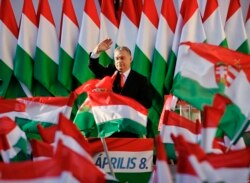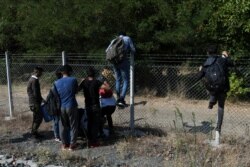Interior ministers from five European Union countries converged on the Mediterranean island of Malta Monday to finalize a deal which would see a redistribution of asylum-seekers who reach the southern shores of Europe from North Africa.
EU officials hope the voluntary burden-sharing scheme being sealed at Monday’s mini-summit between France, Germany, Italy and Malta will later be taken up by other EU states and serve as a model for northern and central European states to also take in asylum-seekers, lifting the migration pressure on the "frontline" states of Italy and Greece.
But Hungarian officials have already warned that Budapest will not participate under any circumstances, arguing the time-limited and voluntary four-nation deal is a surreptitious bid to revive the burden-sharing mechanisms Brussels tried to impose on all EU states at the height of the migration crisis in 2015 and 2016.
Recent upstick
The number of migrants landing in Europe via the Mediterranean Sea has dropped sharply in recent years.
Last year, the U.N. documented about 115,000 arrivals, down from 170,000 in 2017 and over one million in 2015. But there has been an uptick in recent weeks with a rise in numbers arriving on the Greek islands from Turkey, adding to overcrowding in squalid refugee camps on the Greek Aegean islands of Lesbos and Samos.
The abrupt rise in numbers is sparking fears that Europe could be on the brink of a new migration crisis.
Croatia, Finland, Ireland, Lithuania, Luxembourg and Portugal have said they are likely to take an active part in the relocation mechanism after an EU summit next month in Luxembourg. Italian Interior Minister Lamorgese says the Malta meeting will be a “test case” for future migration cooperation and the beginning, she hopes, of an effort to reform European asylum law.
But the fresh attempt to manage an issue that has bitterly divided the EU since 2015 and roiled European politics, fueling the rise of nativist and populist parties, is already drawing fire from populist governments in Central Europe, which opposed the earlier migration burden-sharing proposals, dooming them, and by anti-migration parties in northern Europe.
Orbán's rejection
On Saturday, Hungarian Prime Minister Viktor Orbán flatly rejected the deal during a fiery speech at a far-right populist political festival in Rome, in which he bluntly rejected an appeal by Italian Prime Minister Giuseppe Conte to help by taking in some migrants. “This is impossible,” Orbán retorted.
The Hungarian prime minister scorned Italy’s new open-port policy, a reversal of the approach adopted by Orbán’s political ally Matteo Salvini when he was Italy’s deputy prime minister and the dominant force in a government coalition featuring the populist Lega party and the anti-establishment Five Star Movement.
The coalition collapsed last month and has been replaced by a more Europhile government which has moved quickly to turn the page on Salvini’s anti-migrant policies, which saw the country’s ports closed to NGO humanitarian rescue ships.
Speaking at the annual Atreju' meeting in the Italian capital Orbán said: “If you are willing to repatriate immigrants, we will try to help with repatriation. Shared distribution, not. Shared repatriation would be very good.” He rejected the idea migration can lead to cultural enrichment, arguing integration fails and warned migration brings “public safety problems.”
“In Hungary, in recent years, we have developed a new model of political and state theory, and a Christian-democratic state has been built,” the Hungarian leader said. “In Hungary and here in Italy, people with a mindset similar to ours, we are a minority in the European political elite, but we are a majority among the people.”
Economic migrants vs. war refugees?
Nativist leaders in northern European states say the draft documents of the voluntary pact refer to to asylum-seekers and migrants, and fail to draw a clear distinction between economic migrants and war refugees, opening up the scheme to people who cannot claim to be fleeing conflict or persecution. Italian officials say the fudging of migrant and refugee is only temporary and part of an “emergency-based” solution until disputes between EU states about who should be considered war refugees and who should be deemed economic migrants are settled.
Last week France’s Emmanuel Macron told lawmakers from his centrist party that it must shed what he described as its “bourgeois” stance towards immigration and distinguish between deserving asylum-seekers fleeing war and economic migrants, or risk driving voters into the arms of far-right populists.
Germanys’ Interior Minister, Horst Seehofer, said last week that the EU has a chance to develop a model for the distribution of refugees and migrants rescued at sea. "The new Italian government represents a great opportunity for Europe to create a concept when it comes to migration — in this case, rescued migrants. It would be a major mistake for the German government to miss such an opportunity,” he said.
Distributing migrants
Under the deal, France and Germany could each take 25% of migrants rescued in the Mediterranean. “I hope that the EU's three largest countries will be the locomotive to which a number of other member states can couple their wagons,” Seehofer told the German media.
Hungarian Foreign Minister Peter Szijjarto has slammed the new Italian government's decision to allow private charity ships to disembark migrants rescued at sea. He dubbed the move “deplorable and dangerous” and said the move would create lasting diplomatic problems between his country and Italy. In response, Italian officials have called for sanctions for EU member states who refuse to take in migrants under any proposed redistribution scheme.
In the past two months, more than 13,000 refugees have landed on Greek shores, many of them minors unaccompanied by adults. That is a fraction of landings at the height of the migration crisis in 2016 when Greece was seeing 2,000 disembarkations a day. But it is the first significant jump in numbers since the EU signed an accord with Turkey in which Recep Tayyip Erdoğan agreed to staunch the flood of asylum-seekers into Europe in return for more than $6 billion.
There is some suspicion among European diplomats the spike may be a warning to the EU from Ankara. With Turkey’s economic woes mounting, and reluctance by some EU states to hand over the money amid Erdoğan’s crackdown on dissidents and critics, the Turkish president has repeatedly warned he’ll open the refugee floodgates again. Turkey is hosting four million Syrians and Ankara fears a redoubled offensive in the province of Idlib, abutting the Turkish border, by Syrian government forces will trigger another massive refugee wave.




